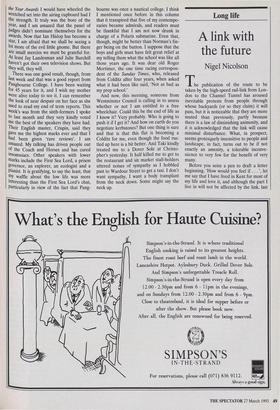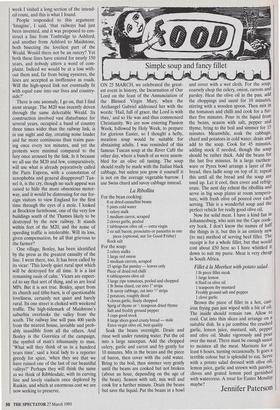Long life
A link with the future
Nigel Nicolson
he publication of the route to be taken by the high-speed rail-link from Lon- don to the Channel Tunnel has aroused inevitable protests from people through whose backyards (or so they claim) it will pass, but it is noticeable that they are more muted than previously, partly because there is a law of diminishing animosity, and it is acknowledged that the link will cause minimal disturbance. What, in prospect, seems grotesquely insensitive to people and landscape, in fact, turns out to be if not exactly an amenity, a tolerable inconve- nience to very few for the benefit of very many.
Before you seize a pen to draft a letter
beginning, 'How would you feel if. let me say that I have lived in Kent for most of my life and love it, and although the part I live in will not be affected by the link, last week I visited a long section of the intend- ed route, and this is what I found.
People responded to this argument: 'Imagine', I said, 'that railways had just been invented, and it was proposed to con- struct a line from Tonbridge to Ashford, and another from Ashford to Maidstone, both bisecting the loveliest part of the Weald. Would there not be an outcry? Yet both these lines have existed for nearly 150 years, and nobody utters a word of com- plaint. Indeed we would be at a loss with- out them and, far from being eyesores, the lines are accepted as inoffensive as roads. Will the high-speed link not eventually fit with equal ease into our lives and country- side?'
There is one anomaly, I go on, that I find most strange. The M20 was recently driven through the same delectable Weald. Its construction involved vast disturbance for several years, occupied a band of country three times wider than the railway link, is in use night and day, creating noise louder and far more continuous than trains pass- ing once every ten minutes, and yet the protests were minimal compared to the fury once aroused by the link. Is it because we all use the M20 and few, comparatively, will use what is already pejoratively called the Paris Express, with a connotation of xenophobia and general disapproval? Tun- nel it, is the cry, though no such appeal was raised to hide the more obnoxious motor- way, and it would be distressing for our for- eign visitors to view England for the first time through the eyes of a mole. I looked at Brockton farmhouse, one of the very few buildings south of the Thames likely to be destroyed by the new railway. It stands within feet of the M20, and the noise of speeding traffic is intolerable. Will its loss, given compensation, be all that grievous to the farmer?
One village, Boxley, has been identified by the press as the greatest casualty of the line. I went there, too. It has been called by its vicar: 'This lovely quiet rural spot which will be destroyed for all time. It is a last remaining oasis of calm.' Vicars are expect- ed to say that sort of thing, and so are local MPs. But it is not true. Boxley, apart from its church and tithe-barn, is of questionable loveliness, certainly not quiet and barely rural. Its one street is choked with weekend traffic. The high-tidemark of Maidstone's suburbia overlooks the valley from the south. The railway line will pass 400 yards from the nearest house, invisible and prob- ably inaudible from all the others. And Boxley is the Guernica of the campaign, the symbol of man's inhumanity to man. 'What will they think of us in a hundred years time', said a local lady to a reporter greedy for spice, 'when they see that we have ruined one of the last of our beautiful valleys?' Perhaps they will think the same as we think of Ribblesdale, with its curving line and lovely viaducts once deplored by Ruskin, and which at enormous cost we are now seeking to preserve.



























































 Previous page
Previous page